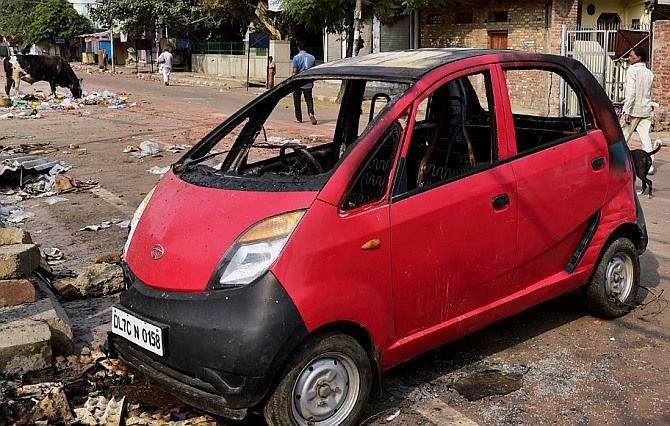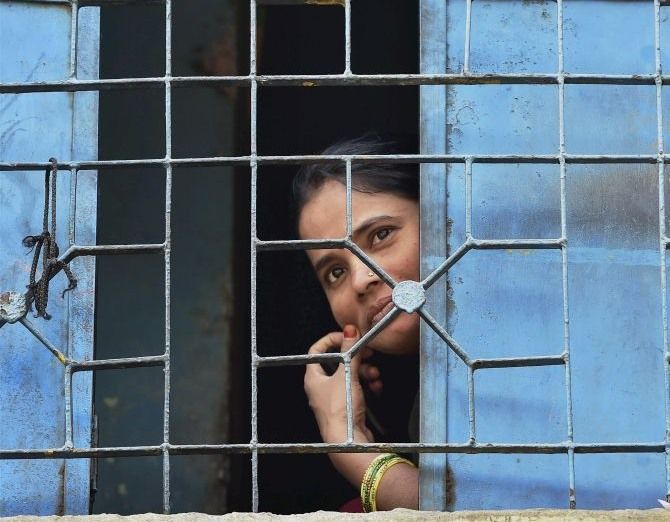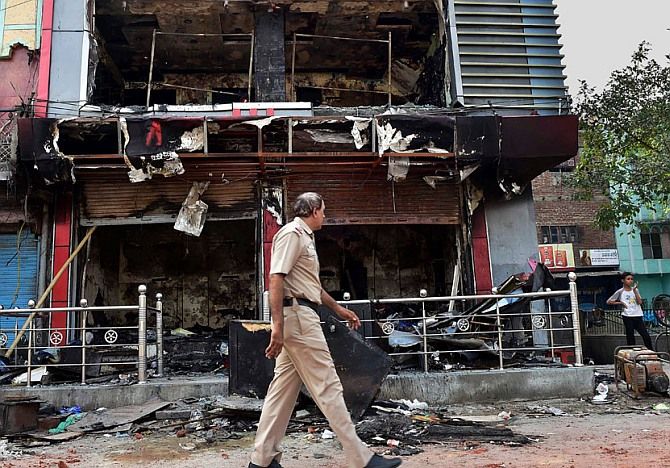Four days after a scuffle between intoxicated young men on Diwali night in Trilokpuri's Block 20 spiralled into a diffused communal riot that resulted in scores of injuries, dozens of arrests, and the incineration of at least one Muslim-owned shop, the violence appears to have abated but tension and suspicion persist.
Over the weekend, many Muslim women and children fled this east Delhi settlement in fear; even as Hindu residents have read this flight as a sign that their Muslim neighbours are planning an attack.
"My wife and children are at my relative's house," said Mohammed Akram, an electrician in Block 27, "The Hindus can attack at any time; the police are on their side."
"The Muslims have sent away their children and wives," said Surinder Singh, a resident of Block 20, "It is clear they will attack the moment the police are withdrawn."
Orders prohibiting the assembly of crowds are in force, markets remain shut, and policemen continue to patrol the streets of this working class residential colony barely 30 minutes from the heart of the national capital.
The unrest is the most recent instance of a communal clash in the increasingly restive Delhi-West Uttar Pradesh belt.
The immediate trigger -- a brawl at a roadside shrine -- is reminiscent of many a riot, but behind the all the shouting lies a tale of temples, toilets and Trilokpuri's chequered history.
Trilokpuri was settled in 1976, when thousands were evicted from slums across south and central Delhi and resettled across 36 blocks.
"Every block had about 500 houses, and space set aside for a central park, six smaller parks and two sets of common toilets and dustbins," said Shakil Raza, a resident, "Each block also has temples and mosques depending on the population."
The religious composition of the slums was replicated in Trilokpuri; five of which - 15, 20, 27, 32 and 36 - have significant Muslim populations, while the remaining blocks are largely dominated by Dalits.
Block 32 was a Sikh block until the October of 1984, when many Sikh families either fled or died in the course of the horrific anti-Sikh riots that followed Indira Gandhi's assassination on October 31 that year.
Memories of 1984 were perceptible in Trilokpuri this weekend, except coloured by 30 years of Hindutva politics.
"Muslims are attacking us just like in 1984," said Surinder Singh, in contradiction of documented evidence by Sikh groups that the Sikhs were killed by Hindu mobs allegedly led by prominent Congressmen.
The 'Butcher of Trilokpuri', Kishore Lal, a Hindu, was convicted for murdering eight Sikhs. "The Hindus and Sikhs are the same religion."
A few years ago, the municipal authorities finally laid out a proper sewage system in the settlement and the public toilets were demolished, leaving behind unclaimed vacant spaces that were used for community functions.
In September this year, a section of the Hindu residents of Block 20 in Trilokpuri decided to set up a Mata-ki-chowki, a temporary roadside shrine, in the space vacated by the toilets.
"A public dustbin had been installed in the vacant spot and the Muslims used to park all their vehicles there. At Eid, they would sacrifice animals," said Sujata Naidu, a Block 20 resident, "We removed the dustbin and put up the chowki to keep the place clean."
Naidu said Sunil Vaidya, the Bharatiya Janata Party's former MLA from Trilokpuri, had encouraged them to set up the chowki, a stone's throw from the local mosque, and assured them of his support in getting permissions from authorities. The chowki was supposed to stand for 40 days till October 31.
On Diwali night, Naidu and her younger brother Deepu, said they spotted a group of men drinking in the area.
"When I told them they couldn't drink near the chowki, they hit me and cut my scalp," Deepu said, claiming that at least some of the men were Muslims.
"They then ran towards the mosque and started stoning the chowki."
In the ensuing confusion, Naidu said, the donation box placed before the idols was stolen.
"This is a fight between foolish young men, which has been turned into a religious conflagration," said Haji Abrar, a Muslim community elder in Block 20, who said the fight began between a group of Hindu and Muslim boys who were drinking together.
"The Hindus near the dustbin have poured a lot of money into building new homes, and now they want to remove the dustbin. There are rumours they want to build a temple."
A day after the stoning, the Naidus and their neighbours met the Vaidya.
"Vaidyji told us to spread the news of the incident on Facebook, and WhatsApp. He said he would help build support for us," said a resident who attended the meeting but asked for anonymity.
Many of the boys, Deepu said, had recorded the stone-pelting on their phones, "The videos have been WhatsApped to everyone." Deepu, who drives a garbage-collection van for a living, said he didn't own a phone.
In an interview, Vaidya dismissed these allegations as false and motivated by his political opponents.
"There is no truth to these allegations," Vaidya said, "On Friday, the resident of Block 20 came to me at 7 in the evening and requested me to call the police as they felt under threat," he said, "I did not ask them to share anything on WhatsApp or Facebook." Vaidya said he had not even visited the chowki and denied any plans to build a temple at the spot.
The day after the meeting, on Saturday, crowds gathered around the Muslim-dominated pockets of the settlement. "We were under attack from all sides," said Rehanna Begum, a resident of Pocket 27, "The boys throwing stones came prepared, they all wore helmets. Then the police came, and they were worse. They arrested our boys and beat our women."
On Saturday night, A-to-Z Collections, a Muslim-owned garments and accessories emporium, was set alight. Thus far, no Hindu-owned shop has been burnt.
"The police was patrolling every corner, so how was our shop set on fire," asked Tarana Khan, as she held back tears, "My father invested his provident fund in this shop."
Tarana said she was one of six sisters and three brothers. "We invested everything in this shop. We still have loans to pay."
In the meantime, prayers continue apace at the chowki at Block 20.
The night-long function on October 31 is scheduled to proceed as planned, but there is now a section of Hindus who want to turn the temporary shrine into a permanent temple.
"We will never allow a dustbin to be put back where the chowki is," said Sujata Naidu, "Ma Kali has entered this space, and now she will not leave. We want a temple on this block."











